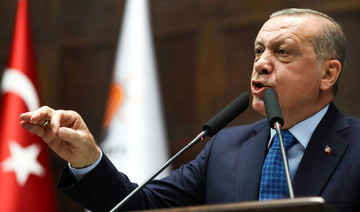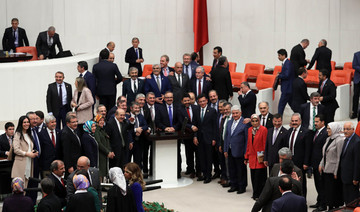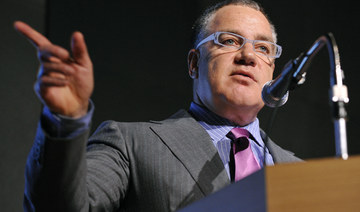ANKARA: Turkey’s main opposition Republican People’s Party (CHP) on Friday nominated one its most prominent and combative lawmakers to challenge President Tayyip Erdogan in the June 24 snap presidential election.
The secularist CHP, which has never won an election against Erdogan in his decade and a half in power, chose 54-year-old ex- high school physics teacher Muharrem Ince as its candidate.
“I will be everyone’s president, a non-partisan president. The depressing times will end on June 24,” Ince told thousands of flag-waving supporters at a rally in Ankara, where he was introduced by party leader Kemal Kilicdaroglu.
Kilicdaroglu had previously said he would not run for president, saying the head of a party should not simultaneously serve as head of state.
Ince is widely known as one of the most spirited speakers from the opposition in parliament. He ran as the sole challenger for party leadership against Kilicdaroglu in the last two CHP party elections, in 2014 and 2018.
He is seen as a candidate who can match the harsh rhetoric often used by Erdogan, while also drawing in more conservative and right-wing voters, beyond the CHP’s base of secular, Western-oriented Turks.
Ince said that as president, he would not live in the 1,000-room presidential palace built by Erdogan in Ankara, saying he would turn it into a “haven of learning” instead.
Against Erdogan, a masterful campaigner, the CHP has failed to gain momentum outside its core base of secular voters. In the last parliamentary election in November 2015 it took 25.3 percent of the vote, with much of that coming from large cities such as Istanbul and Izmir and the western coastal region.
Ince, a lawmaker from the northwestern province of Yalova, vowed to end partisanship in the judiciary and public services, and make amendments to an ailing economy suffering double-digit inflation, a gaping current account deficit and a slide in the lira of more than 10 percent against dollar this year.
Erdogan’s most credible challenge, however, is seen as coming not from the CHP but former Interior Minister Meral Aksener, who last year founded the Iyi (Good) Party after splitting with the nationalist MHP, which is backing Erdogan.
An opinion poll conducted in mid-April put Erdogan well ahead in the race with 40 percent followed by Aksener at 30 percent, Ince 20 percent and the jailed pro-Kurdish opposition HDP party leader Selahattin Demirtas under 10 percent.
The CHP, the Iyi Party and two other parties are this week expected to seal an election alliance to create a broad coalition against Erdogan. This has raised speculation that the CHP could pull its candidate in the second round of voting and back Aksener.
To win in the first round, a candidate needs more than 50 percent of the votes. Polls indicate a second round is likely to transpire and would be on July 8 if necessary.
Turkey’s main opposition nominates combative e-teacher to challenge Erdogan
https://arab.news/yp4wr
Turkey’s main opposition nominates combative e-teacher to challenge Erdogan
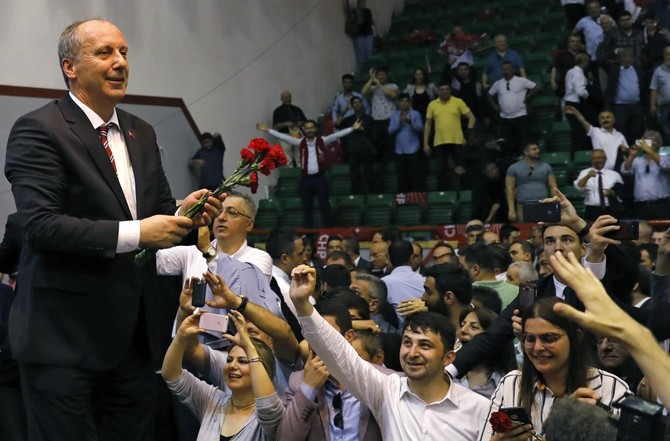
- Ince, a lawmaker from the northwestern province of Yalova, vowed to end partisanship in the judiciary and public services
- To win in the first round, a candidate needs more than 50 percent of the votes
UNRWA chief says again barred entry to Gaza by Israel

“Just this week, they have denied — for the second time — my entry to Gaza where I planned to be with our UNRWA colleagues including those on the front lines,” Philippe Lazzarini wrote on X, formerly Twitter.
Lazzarini has been to Gaza four times since the war broke out including on March 17.
“The Israeli authorities continue to deny humanitarian access to the United Nations,” he said on Sunday.
“Only in the past two weeks, we have recorded 10 incidents involving shooting at convoys, arrests of UN staff including bullying, stripping them naked, threats with arms & long delays at checkpoints forcing convoys to move during the dark or abort,” Lazzarini said.
He also called for an “independent investigation” into rocket fire that led to the closure of a key Israel-Gaza aid crossing.
Hamas’s armed wing, Ezzedine Al-Qassam Brigades, claimed responsibility for the Sunday launch, saying militants had targeted Israeli troops in the area of Kerem Shalom crossing.
Pakistan’s Dr. Shahzad Baig makes it to TIME’s 100 world leaders in health

- Before arriving in Pakistan, Baig was a technical adviser to Nigeria’s polio eradication effort, which remained successful
- Pakistan, Afghanistan are only two countries in world where polio continues to threaten health and well-being of children
ISLAMABAD: US news magazine TIME has included Dr. Shahzad Baig, the Pakistan Polio Eradication Programme’s national coordinator, to its list of 100 most influential people across the world in the field of health in 2024.
The list, titled ‘TIME100 HEALTH,’ this week honored individuals from across the world for their services for fresh discoveries, novel treatments, and global victories over disease.
Baig was recognized for his efforts for the eradication of poliovirus, which mainly affects children under the age of ten years by invading their nervous system, and can cause paralysis or even death.
Pakistan and Afghanistan are the only two countries in the world where polio continues to threaten the health and well-being of children.
“On the front lines in the effort to stamp it [polio] out is Dr. Shahzad Baig, national coordinator of Pakistan’s polio-eradication program,” TIME wrote on its website.
“In 2019, polio disabled or killed 147 people in Pakistan; since Baig assumed the position, in 2021, case counts have plummeted, with only six children stricken in 2023.”
Before arriving in Pakistan, Baig was a technical adviser to Nigeria’s polio eradication effort, which succeeded spectacularly, according to the US magazine.
In 2020, the African country became the most recent one in the world to be declared polio-free.
“If Baig has his way, Pakistan will be the next,” it added.
Saudi CEO to attend Gulf Creatives Conference at Harvard University
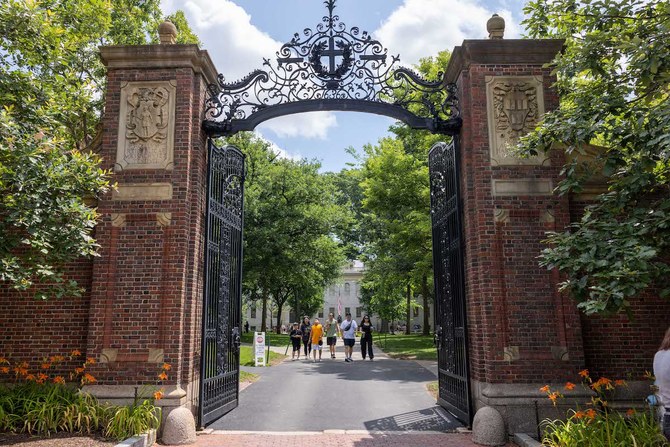
- Al-Fayyadh will articulate the hospital’s vision for the future of healthcare regionally and globally
RIYADH: Majid Ibrahim Al-Fayyadh, CEO of the King Faisal Specialist Hospital & Research Center, will take part in the Gulf Creatives Conference at Harvard University from May 10-12, Saudi Press Agency reported on Sunday.
The conference will be a platform for influential voices from the Arab Gulf nations within the US academic landscape to illuminate the region’s expertise and accomplishments across diverse fields while charting a course for the future.
The conference will draw together distinguished leaders from both public and private sectors across the GCC, embodying the region’s dynamic potential and innovative ethos in sectors including sports, the arts, media, entrepreneurship, technology, non-profit endeavors, public policy, and healthcare.
The event is organized by The Diwan, a student-run organization representing those studying at Ivy League universities.
The GCC event will host 24 discussion sessions and five workshops.
Discussions will cover public policy landscapes, innovation strategies, and the future landscape of healthcare, inviting active participation from all attendees.
During the event, Al-Fayyadh will deliver a keynote address spotlighting the center’s achievements and its pivotal role in advancing Saudi Arabia’s healthcare transformation journey.
Additionally, he will articulate the hospital’s vision for the future of healthcare regionally and globally, underscoring its commitment to innovation and excellence.
Canada has ‘political compulsion’ to blame India for Sikh slaying — New Delhi

- Canadian police on Friday arrested three for the murder of Hardeep Singh Nijjar, saying they were investigating their links to Indian government
- The killing soured Ottawa-New Delhi diplomatic ties after PM Trudeau said there were ‘credible allegations’ linking Indian intelligence to crime
NEW DELHI: Canada’s investigation into alleged Indian involvement in the assassination of a Sikh separatist in Vancouver last year is a “political compulsion,” New Delhi’s foreign minister said after three Indian citizens were arrested over the killing.
Canadian police on Friday arrested the trio for the murder of Hardeep Singh Nijjar, saying they were investigating their links to the Indian government, “if any.”
The killing sent diplomatic relations between Ottawa and New Delhi into a tailspin last autumn after Prime Minister Justin Trudeau said there were “credible allegations” linking Indian intelligence to the crime.
India vehemently rejected the allegations as “absurd,” halting the processing of visas for a time and forcing Canada to significantly reduce its diplomatic presence in the country.
“It is their political compulsion in Canada to blame India,” the Press Trust of India news agency quoted external affairs minister S. Jaishankar as saying on Saturday.
Thousands of people were killed in the 1980s during a separatist insurgency aimed at creating a Sikh homeland known as Khalistan, which was put down by security forces.
The movement has largely petered out within India, but in the Sikh diaspora — whose largest community is in Canada, with around 770,000 people — it retains support among a vocal minority.
New Delhi has sought to persuade Ottawa not to grant Sikh separatists visas or political legitimacy, Jaishankar said, since they are “causing problems for them (Canada), for us and also for our relationship.”
He added that Canada does not “share any evidence with us in certain cases, police agencies also do not cooperate with us.”
Nijjar immigrated to Canada in 1997 and acquired citizenship 18 years later. He was wanted by Indian authorities for alleged terrorism and conspiracy to commit murder.
The three arrested Indian nationals, all in their twenties, were charged with first degree murder and conspiracy.
They were accused of being the shooter, driver and lookout in his killing last June.
The Canadian police said they were aware that “others may have played a role” in the murder.
In November, the US Justice Department charged an Indian citizen living in the Czech Republic with plotting a similar assassination attempt on another Sikh separatist leader on American soil.
A Washington Post investigation reported last week that Indian foreign intelligence officials were involved in the plot, a claim rejected by New Delhi.
Houthis claim Red Sea victory against US Navy

- Militia forces lack technical or military capability to achieve their objectives in the Mediterranean, analyst says
AL-MUKALLA: The Houthis have reiterated a warning of strikes against ships bound for or with links to Israel — including those in the Mediterranean — as they claimed victory against the US Navy in the Red Sea.
The Houthi-controlled SABA news agency reported that the fourth phase of the militia’s pro-Palestine campaign would involve targeting all ships en route to Israel that came within range of their drones and missiles, noting that the US, UK, and other Western navies “stood helpless” in the face of their attacks.
“The fourth phase demonstrates the striking strength of the Yemeni armed forces in battling the world’s most potent naval weaponry, the American, British and European fleets, as well as the Zionist (Israel) navy,” SABA said.
Houthi military spokesman Yahya Sarea said on Friday strikes against Israel-linked ships would be expanded to the Mediterranean. Attacks would be escalated to include any companies interacting with Israel if the country carried out its planned attack on the Palestinian Rafah.
Since November, the Houthis have launched hundreds of ballistic missiles and drones at commercial and navy vessels in the Red Sea, Bab Al-Mandab Strait and the Gulf of Aden. They claim attacks are only aimed at ships linked with Israel in a bid to force an end to its siege on the Gaza Strip.
They have also fired at US and UK commercial and navy ships in international waters off Yemen after the two countries launched strikes against Houthi-controlled areas.
On Saturday, Houthi information minister Dhaif Allah Al-Shami claimed the US was forced to withdraw its aircraft carrier and other naval ships from the Red Sea after failing to counteract attacks. He added new offensives would begin against Israeli ships in the Mediterranean in the coming days.
“They failed badly. Yemeni missiles and drones beat the US Navy, and its military, cruisers, destroyers and aircraft carriers started to retreat from our seas,” Al-Shami said in an interview with Lebanon’s Al-Mayadeen TV news channel.
Yemen specialists have disputed Houthi assertions that they have military weapons capable of reaching Israeli ships in the Mediterranean.
Brig. Gen. Mohammed Al-Kumaim, a Yemeni military analyst, told Arab News on Sunday the Houthis would only be able to carry out such attacks if they had advanced weaponry. He said the Houthis were expanding their campaign against ships to avoid growing public resentment in areas under their control after the militia had failed to pay public employees and repair services.
Al-Kumaim added the Houthis might claim responsibility for an attack on a ship in the Mediterranean which was carried out by an Iran-backed group operating in the region.
“Theoretically and technologically, the Houthis lack any technical or military capability to achieve their objectives (in the Mediterranean),” Al-Kumaim said.


